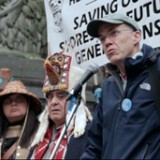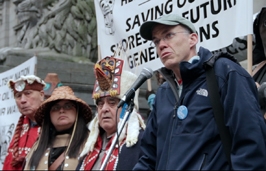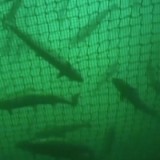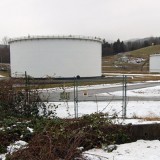Read this story form the Hill Times on the Harper Government’s intention laid out in its recent budget bill to go after charities who are critical of its oil and resource development plans. (March 29, 2012)
Opposition MPs say a surprise allegation in the federal budget that Canadian charities are violating federal rules limiting their political advocacy is retribution for widespread opposition from environmental groups to the massive Northern Gateway oil sands pipeline across British Columbia.
PARLIAMENT HILL—Opposition MPs say a surprise allegation in the federal budget that Canadian charities are violating federal rules limiting their political advocacy is retribution for widespread opposition from environmental groups to the massive Northern Gateway oil sands pipeline across British Columbia.
The obscure provision in the budget Thursday to beef up the Canada Revenue Agency’s “enforcement tools” to monitor political activities of charities demonstrates the partisan nature of the Conservative government, opposition MPs said.
NDP MP Megan Leslie (Halifax, N.S.) told The Hill Times the measure is one of several provisions that show the budget, aside from its main thrust of public service spending cuts, is all “pipeline, pipeline, pipeline.”
“The over-arching theme here is this is a budget for the great pipeline to China,” Ms. Leslie said. “This is about pipelines, pipelines, pipelines, and at any cost.”
“Whether it is going after charities, who might have a different opinion, cutting the National Roundtable on the Environment and the Economy and cutting Environment Canada and not relying on science and evidence, or whether it’s going after the Environmental Assessment Act and weakening it, that’s what this budget says to me, it’s all about pipelines,” Ms. Leslie said.
The reference to political activities of charities was a needle in the haystack of the budget’s total $5.2-billion in broad spending cuts the government of Prime Minister Stephen Harper (Calgary Southwest, Alta.) is proposing for the next three years, with a projection that the spending reductions, combined with other economic forecasts, will result in a surplus by 2015, the next federal election year.
But the measure was so unexpected at the traditional pre-budget lockup for journalists that Reuters news correspondent David Ljunggren asked Finance Minister Jim Flaherty (Whitby Oshawa, Ont.) about it at a news conference before Mr. Flaherty tabled the budget in the Commons, asking Mr. Flaherty why the budget was putting the “tax police” on charities.
“We’re not making any changes in the rules relating to charities, we are providing some resources, some additional resources for enforcement of the rules by the Canada Revenue Agency,” Mr. Flaherty said.
“Quite frankly, we’ve had a lot of complaints and concerns expressed by Canadians that when they give money to charities they expect the money to be used for the charities purposes, not for political or other purposes,” he said.
“This not black and white, because the Canada Revenue Agency permits a small percentage of dollars to be used for advocacy and other purposes, but there is clearly a need, in our view, for more vigilance, that charities obey the rules as they are now,” Mr. Flaherty said.
The main budget document noted charities are allowed to engage in political activities, centered primarily on advocacy, as long as the activities are related to their charitable goals and represent a limited portion of their resources—no more than 10 per cent for larger charities.










